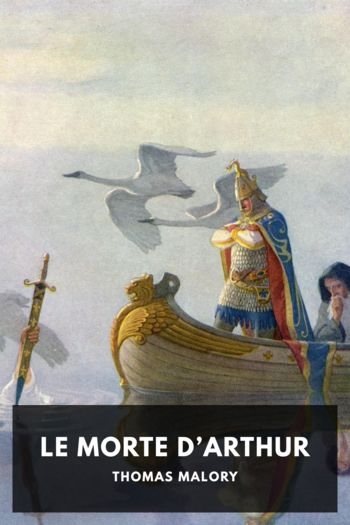Le Morte d’Arthur - Thomas Malory (best android ereader TXT) 📗

- Author: Thomas Malory
Book online «Le Morte d’Arthur - Thomas Malory (best android ereader TXT) 📗». Author Thomas Malory
How Sir Tristram took with him the shield, and also how he slew the paramour of Morgan le Fay.
So then Sir Tristram took his leave of the queen, and took the shield with him. Then came the knight that held Queen Morgan le Fay, his name was Sir Hemison, and he made him ready to follow Sir Tristram. Fair friend, said Morgan, ride not after that knight, for ye shall not win no worship of him. Fie on him, coward, said Sir Hemison, for I wist never good knight come out of Cornwall but if it were Sir Tristram de Liones. What an that be he? said she. Nay, nay, said he, he is with La Beale Isoud, and this is but a daffish152 knight. Alas, my fair friend, ye shall find him the best knight that ever ye met withal, for I know him better than ye do. For your sake, said Sir Hemison, I shall slay him. Ah, fair friend, said the queen, me repenteth that ye will follow that knight, for I fear me sore of your again coming. With this this knight rode his way wood wroth, and he rode after Sir Tristram as fast as he had been chased with knights. When Sir Tristram heard a knight come after him so fast he returned about, and saw a knight coming against him. And when he came nigh to Sir Tristram he cried on high: Sir knight, keep thee from me. Then they rushed together as it had been thunder, and Sir Hemison brised his spear upon Sir Tristram, but his harness was so good that he might not hurt him. And Sir Tristram smote him harder, and bare him through the body, and he fell over his horse’s croup. Then Sir Tristram turned to have done more with his sword, but he saw so much blood go from him that him seemed he was likely to die, and so he departed from him and came to a fair manor to an old knight, and there Sir Tristram lodged.
XLIIIHow Morgan le Fay buried her paramour, and how Sir Tristram praised Sir Launcelot and his kin.
Now leave to speak of Sir Tristram, and speak we of the knight that was wounded to the death. Then his varlet alighted, and took off his helm, and then he asked his lord whether there were any life in him. There is in me life, said the knight, but it is but little; and therefore leap thou up behind me when thou hast holpen me up, and hold me fast that I fall not, and bring me to Queen Morgan le Fay; for deep draughts of death draw to my heart that I may not live, for I would fain speak with her or I died: for else my soul will be in great peril an I die. For[thwith] with great pain his varlet brought him to the castle, and there Sir Hemison fell down dead. When Morgan le Fay saw him dead she made great sorrow out of reason; and then she let despoil him unto his shirt, and so she let him put into a tomb. And about the tomb she let write: Here lieth Sir Hemison, slain by the hands of Sir Tristram de Liones.
Now turn we unto Sir Tristram, that asked the knight his host if he saw late any knights adventurous. Sir, he said, the last night here lodged with me Ector de Maris and a damosel with him, and that damosel told me that he was one of the best knights of the world. That is not so, said Sir Tristram, for I know four better knights of his own blood, and the first is Sir Launcelot du Lake, call him the best knight, and Sir Bors de Ganis, Sir Bleoberis, Sir Blamore de Ganis, and Sir Gaheris. Nay, said his host, Sir Gawaine is a better knight than he. That is not so, said Sir Tristram, for I have met with them both, and I felt Sir Gaheris for the better knight, and Sir Lamorak I call him as good as any of them except Sir Launcelot. Why name ye not Sir Tristram? said his host, for I account him as good as any of them. I know not Sir Tristram, said Tristram. Thus they talked and bourded153 as long as them list, and then went to rest. And on the morn Sir Tristram departed, and took his leave of his





Comments (0)